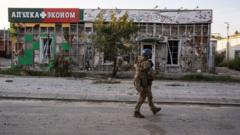An anticipated meeting could reshape international relations, yet analysts caution that the timing remains crucial amid ongoing military tensions.
Kremlin Signals Openness for Trump-Putin Dialogue Post-Inauguration

Kremlin Signals Openness for Trump-Putin Dialogue Post-Inauguration
The Kremlin has confirmed Russia's willingness to engage in dialogue with President-elect Trump after he assumes office, as discussions about the Russia-Ukraine conflict loom.
In a significant development on January 10, 2025, the Kremlin expressed its readiness for a potential meeting between President Vladimir V. Putin and President-elect Donald J. Trump, emphasizing that any concrete arrangements would materialize only after Trump's inauguration on January 20. This response came after Trump remarked on Thursday that Putin wishes to meet him to discuss the protracted war in Ukraine.
Dmitri S. Peskov, spokesman for the Kremlin, reiterated that Russia seeks a dialogue and acknowledged Trump’s stated willingness to engage on this front. He remarked, “We need a mutual desire and political willingness to engage in dialogue,” indicating that both sides seem open to negotiations. However, Peskov did not confirm Trump’s assertion that a meeting was already in the works.
As the Kremlin maintains its territorial claims over regions in Ukraine, it insists on diplomacy rather than warfare. Nevertheless, Ukrainian officials and their Western allies remain skeptical about Russia's commitment to genuine negotiations, fearing that the Kremlin's terms could effectively demand Ukrainian surrender.
A meeting with the new American president could represent a crucial turning point for Putin, who has faced international isolation since Russia's incursion into Ukraine. Trump has made bold claims about his ability to resolve the conflict within as little as 24 hours but recently suggested that a resolution may take longer—up to six months. He has echoed sentiments aligning with Russian interests, particularly regarding Ukraine’s NATO membership, which Russia opposes.
While Trump’s election has incited cautious optimism concerning potential de-escalation of hostilities, expert analysts warn that negotiating in the current atmosphere of military engagement could be dicey. Giorgy Bovt, a Russian political commentator, expressed that an early meeting could exacerbate tensions if the conditions for peace are not adequately established, stating that both sides seem to believe they can continue military actions.
Tatiana Stanovaya, a senior fellow at the Carnegie Russia Eurasia Center, cautioned that heightened expectations surrounding a meeting could backfire, especially for Trump. As the world watches closely, the upcoming inauguration could herald a transformative phase in the Russia-Ukraine conflict’s trajectory.
Ivan Nechepurenko reports on Russia, Ukraine, and surrounding regions, providing insights into these pivotal geopolitical events.























